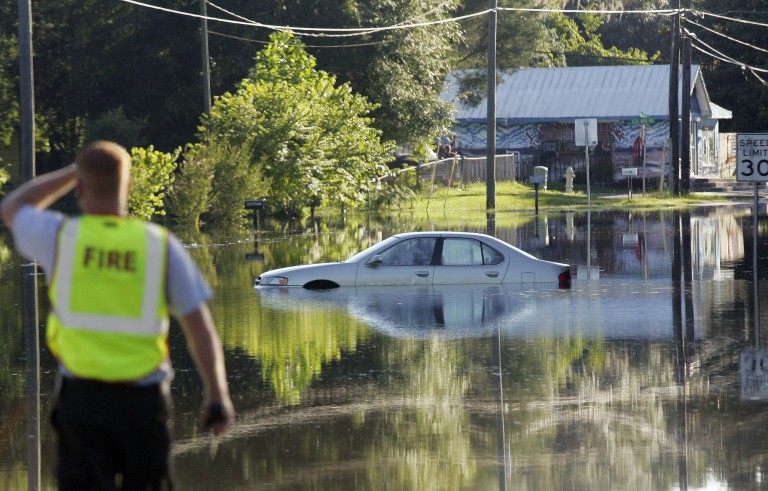(单词翻译:单击)
GWEN IFILL: But, first, a trio of new studies provide new alarm about rising sea levels, and the prospect of further flooding along the coasts.
Among them, seas rose faster during the past century than at any point in the last 2,800 years.
Hari Sreenivasan is here with more on the story.
HARI SREENIVASAN: Scientists say this is more definitive proof that human actions are contributing to sea level rise. Already, coastal cities like Charleston, South Carolina, and Miami, Florida, for example, are facing more flood days than in decades past.
The global climate conversation is working toward keeping temperature rise limited to two degrees Celsius, and even under that scenario, as this animation shows, cities like Washington, D.C., and its well-known landmarks could look very different one day, albeit several hundred years in the future.
One study estimated that sea rise level could be as much as four feet higher by the end of this century under more dire scenarios.
Benjamin Strauss is with Climate Central, a research organization that worked on some of this.
So, Benjamin, when you see your graphs at the very end of it, there's this almost hockey stick effect. What is it that caused that acceleration of sea level rise?

BENJAMIN STRAUSS, Climate Central: The sea level is extremely sensitive to global temperature. And by burning fossil fuels and putting carbon in the atmosphere, we have heated up the planet a great deal over the last century.
HARI SREENIVASAN: So, how do we know in these models — how do you build these models to figure out what sea level rise was like going back 2,000 years? There wasn't somebody with a stick saying, here it is at 2.5 feet, here it is at three.
BENJAMIN STRAUSS: Yes, it's true.
So, there was a lot of detective work involved. Scientific teams around the world have been studying coastal marshes, taking cores, looking for clues about where things grew, at what times. And this study is special, in that it went beyond each of the individual studies that we have seen in the past, and integrated them all, to put together one picture out of all of that detective work.
HARI SREENIVASAN: So, let's talk a little bit about impacts.
Take a city like Charleston, a low-lying city already that we know is facing some of these floods. What's it likely to be like going forward, say, to the end of this century?
BENJAMIN STRAUSS: Well, really, the sharp increase in floods caused by us that we have seen over the last several decades is only just the beginning.
We're a few inches into a problem that's going to be measured in feet this century. And I'm afraid to say we can expect floods and flooding to accelerate a great deal more, even in the next two or three decades, than in the — than what we have already seen in the last two or three decades.
HARI SREENIVASAN: As we mentioned, the climate conferences that happen around the world, they're really trying to figure out this two-degree Celsius target, but your forecasts and your predictions and your models are showing that even at two degrees Celsius, there's a tremendous amount of increase in sea level rise, and a lot of coastal cities are impacted by this.
BENJAMIN STRAUSS: Yes.
In the long run, two degrees Celsius warming probably is not — a lot of today's coastal cities are probably not compatible with that, whether you're talking about Miami or Shanghai or London.
But two degrees is a great deal better than our current path. So there's some solace in that. And how quickly sea level rises will play a large role in how well we can adapt. I would also say that if we can end up being more ambitious than two degrees Celsius and cut warming down to 1.5 degrees in the long run, the impact there would be about half of what we could expect from two degrees Celsius. So that last half degree makes a big difference.
HARI SREENIVASAN: This conversation about two degrees or a half-a-degree here or half-a-degree there, often, it gets mired in politics, it gets mired in lifestyle changes, and you start thinking globally and different countries.
I mean, reading your data at some point is an incredibly sort of sad and dire prediction. Is there any way through this?
BENJAMIN STRAUSS: Yes, well, it is sad, and it's a difficult line of work, in a way.
But I take some solace. First of all, there's a lot we can do to adapt and to deal with change over time. And I take some solace in knowing all people are mortal. Right? But we still live our lives. We still have meaningful lives.
There are some places on our coasts now which we now know are especially mortal because of sea level rise. It won't stop them from making contributions for the next decades or the next century, but, over time, we're going to have to either build tall walls and live beneath — you know, in the bottom very deep bowls, which is a frightening prospect, or else we're going to have the move.
HARI SREENIVASAN: All right, Ben Strauss of Climate Central, thanks so much for joining us.
BENJAMIN STRAUSS: Yes, thank you.


